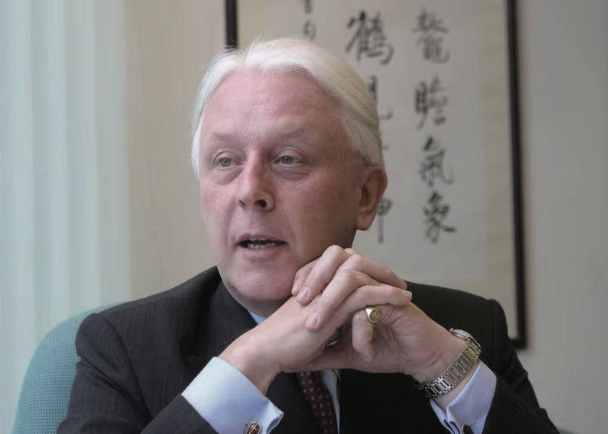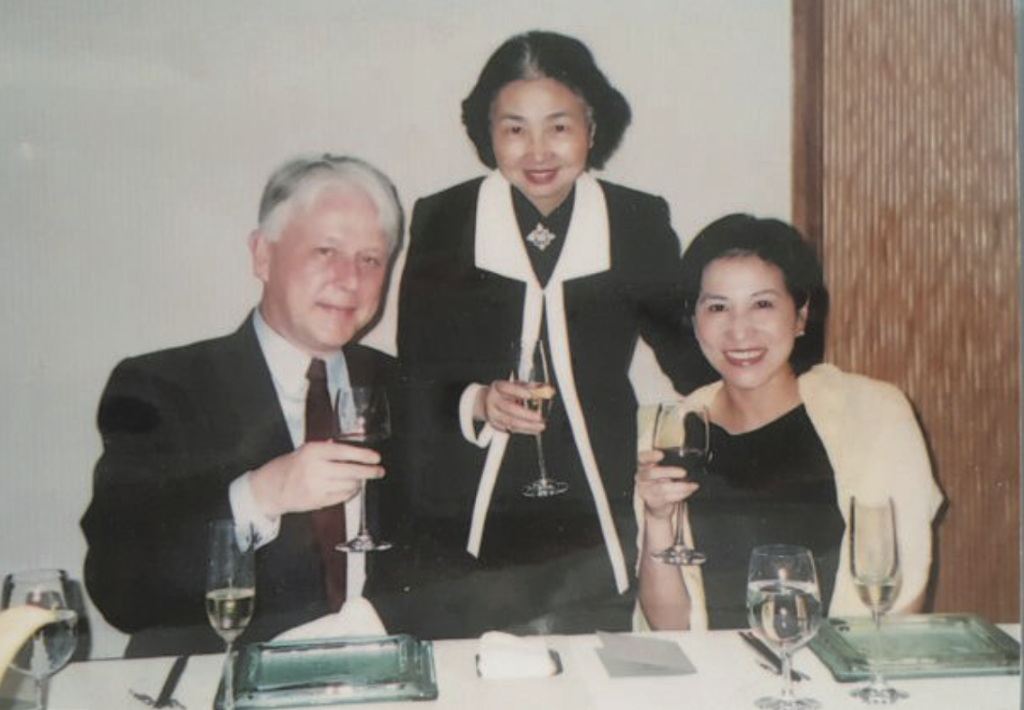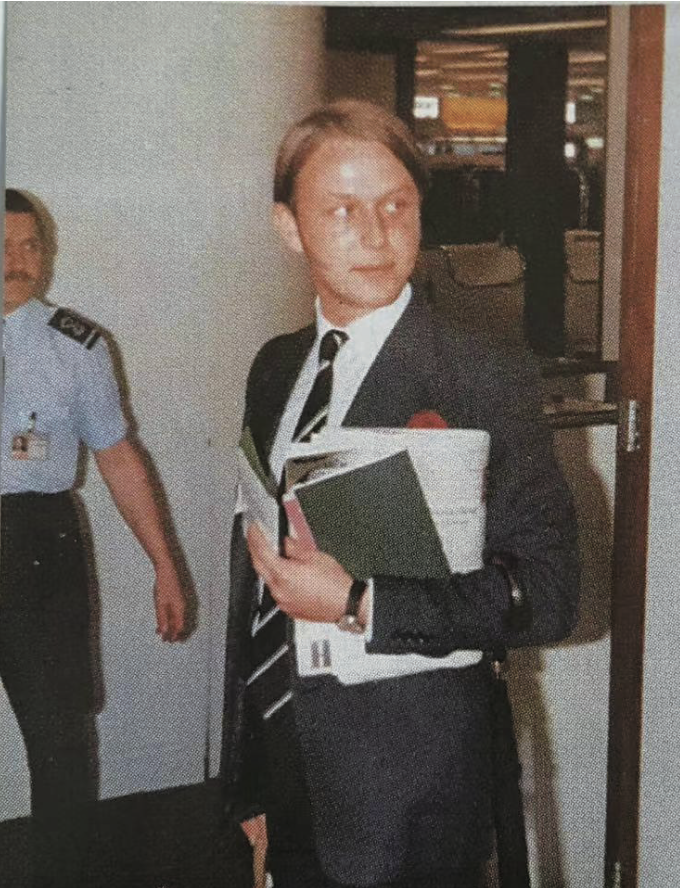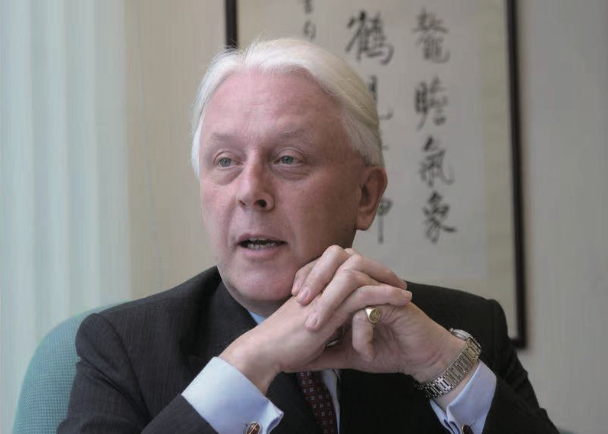GRENVILLE CROSS: International friends can take great comfort from Hong Kong’s progress over the last 25 years
Grenville Cross GBS SC served as the Director of Public Prosecutions of Hong Kong from 1997 to 2009. As a British national, he first came to Hong Kong in 1978, and then stayed here ever since. He developed a keen interest in Chinese history, and started collecting historical items. He also met his dear wife, a police inspector, and decided that Hong Kong was where his future lay.
He is a Senior Counsel and Professor of Law. He was awarded the Gold Bauhinia Star in 2021.
He accepted our written interview on Feb 18, to talk about his thoughts on the very city which is celebrating the 25th anniversary of its return to the motherland.
Interview by Mali Zhou, Bauhinia Magazine

The journey begun with an ad in The Times
BAUHINIA: What made you come to Hong Kong in 1978, and why have you stayed here ever since?
CROSS: In 1978, I was working in London as a prosecutor for the Customs and Excise Department, handling mainly drugs, smuggling and tax cases. When I saw an advertisement in The Times for a prosecutor in Hong Kong, I jumped at the opportunity, imagining it would be a great experience. When I was a child, I lived, because of my father’s work, in various places, including Cyprus, Germany and Russia, although we never made it to the Far East, and travel was in my blood.
Once I arrived in Hong Kong, all my expectations were fulfilled, although, to start with, it was a bit of a culture shock. Workwise, the cases I handled were often significant, and, at a very early stage, I found myself prosecuting murder, robbery and rape trials, something that would not have been possible in England until much later in my career. The city itself was amazing, in terms of lifestyle, vibrancy and food, and I was entranced. I was enormously impressed by everybody’s “can-do” attitude, and their belief that, if they worked hard and did their best, the sky was the limit. The local people were always very kind to me, and, apart from making some good friends, I also met my wife, a police inspector, and decided that Hong Kong was where my future lay.
I also developed a keen interest in Chinese history, and started collecting historical items, including photographs, postcards and porcelain. I joined the Hong Kong Collectors Society, of which I am now Vice President, and I often exhibit with them. My favorite subject at school was history, although China was rarely mentioned, but I have now corrected that. China, of course, has a rich history, and anybody who wants to understand the political situation now should study it. They will acquire important insights into how some Western powers have always seen China, and the reasons they resent its rise.

Led the Prosecutions Division into the IAP
BAUHINIA: You are the first Director of Public Prosecutions (DPP) to be appointed after Hong Kong’s return in 1997, and the longest serving of over 12 years. What are your most significant memories of your unprecedented 12 years in office?
CROSS: As I served as DPP for over 12 years, I have many fascinating memories. I vividly recall, for example, conducting the very first case to be heard by the Court of Final Appeal, in September 1997, which concerned an appeal against an assault conviction, and this attracted huge interest. I also remember prosecuting Yip Kai-foon, known as “goose head”, whose gang terrorized Central with its daring and violent robberies, and who was captured after a shootout in Western District that left him paralyzed. There were fears that Yip’s gang might try to free him when he went to the Court of Final Appeal to challenge his conviction, so the Court had to relocate from the French Mission Building, where it was then housed, to the High Court, which had better security, and his gang, fortunately, kept away.
As DPP, I tried to modernize our prosecution service and to make it more transparent, so that people would appreciate it better and trust it more. I regularly issued prosecution guidelines, including ones on domestic violence and victims’ rights, and this helped to make our operations more understandable to the community. This openness, I found, was generally welcomed, as also was my practice of briefing the media and legislators on controversial decisions, particularly when we decided not to prosecute public figures who were suspected of criminality.
I also established, for the first time, close relations with prosecutors from elsewhere in China, including in Beijing, Guangdong and Macao, and this resulted in constructive cooperation in various areas. In 2001, I led the Prosecutions Division into the International Association of Prosecutors (IAP), as its 75th organizational member, and this provided us with invaluable contacts and enabled us to contribute to global initiatives to advance criminal justice. In 2007, I hosted the IAP’s 12th Annual Conference and General Meeting at the HKCEC, which was very successful and saw the prosecutors of the world descending on Hong Kong and getting to know the city. I was also elected to the IAP’s Executive Committee, and this gave Hong Kong a voice at the top table.
BAUHINIA: You are the first DPP to be appointed after Hong Kong’s return in 1997. But before the return, some said that foreigners would not be able to hold senior postions such as the DPP after the return. Can you explain the background to your becoming the DPP?
CROSS: The first thing to say is that the appointment was a big surprise. I had worked as a prosecutor in Hong Kong for almost 20 years, and it was obviously gratifying to reach the top. But it was unexpected, for, although I was a permanent resident, I was not a Chinese national.
You must remember that, for most of the colonial era, all the senior government positions were held by expatriates. With the approach of 1997, Governor Chris Patten’s administration panicked, and embarked upon a localization policy that was, frankly, very haphazard. The policy had not been properly considered, and it endangered civil service stability and damaged morale at a crucial time. Although it may be unfair to suggest, as some have done, that Patten’s policy was a deliberate attempt to weaken the post-1997 civil service, it was certainly short-sighted. It saw the departure of many experienced people, including prosecutors, who were either forced out or left because they thought their careers were over.
Although I was the Deputy DPP, I was told I could not become the DPP when a vacancy arose in 1994. The post, I was advised, had to be “localized”, meaning it was to go to somebody who was ethnically Chinese. This struck me as contrary to the Hong Kong Bill of Rights, that provides for equality of treatment, but there was little I could do. I certainly responded that, as a permanent resident, I considered myself a “local”, but this was brushed aside. This, of course, was a bitter pill to swallow, but I nonetheless decided to soldier on, which was fortunate.
After 1997, things changed drastically for people like me. The incoming administration of Tung Chee-hwa was pragmatic and fair, and did not discriminate because of where people originated. As I was considered the most suitable person, I was duly appointed the DPP, and the rest, as they say, is history.

On Hong Kong:
“great opportunities awaiting the bold”
BAUHINIA: Can you elaborate on how you view Hong Kong’s future, and the country’s overall development?
CROSS: Yes, I am very confident about the city’s future, not only as a unique Chinese city but also as a key player in national resurgence. It has geographical advantages, an independent judiciary, a stable political situation, an attractive tax regime, and a business-friendly environment. It is also one of the safest cities in Asia, and people need have no fears in their homes or when walking around. These attributes make it highly attractive for anybody involved in, for example, banking, business or commerce, as well as for tourists and other visitors. Its physical positioning could not be better, and it provides a door to the Guangdong-Hong Kong-Macao Greater Bay Area, with which it is now achieving greater integration.
Quite clearly, Hong Kong is multi-talented, and it must fully project its influence over the next 25 year. With, for example, its financial prowess and legal strengths, it is well placed to contribute to the Belt and Road Initiative (BRI), and this will definitely enhance its clout. The central authorities have always shown great confidence in the city, and it must reciprocate by playing a significant role in national development. Entrepreneurs should not think twice about setting up shop here, and there are great opportunities awaiting the bold. I would say Hong Kong is very much the place to be, going forward.
On your wider question, China has witnessed huge changes in recent times, and these are now bearing fruit. The living standards of ordinary people have vastly improved, and there is great progress across the board, including in engineering, medicine and technology. China is projected to have the world’s largest economy by 2028, and, through the BRI, it is facilitating global development. In other words, the country is finally coming into its own.
Although some Western powers resent the rise of a nation they once subjugated, they really must wise up, in their own best interests. They will never again be able to exploit, humiliate or abuse the Chinese people, whose country is now, as a result of their own endeavors and wise leadership, assuming its rightful role in global affairs. With or without their friendship, China will contribute positively to the development of the world in the 21st century, and it can undoubtedly assist mankind in many ways.
Over the last 25 years:
Hong Kong has retained its core values
BAUHINIA: As an advocate for Hong Kong in foreign countries, how do you think the international community should view the city in 2022, the 25th anniversary of its reunification with the motherland?
CROSS: This question requires a context. The “one country, two systems” governing policy for Hong Kong is visionary, and it has provided the city with an assured future since 1997. The policy is enshrined in the Basic Law, the whole emphasis of which is upon continuity, with the capitalist system and way of life being guaranteed for 50 years. As a local administrative region coming directly under the Central People’s Government, Hong Kong enjoys a special status, and this includes exercising its “high degree of autonomy”.
In practical terms, this has meant that Hong Kong has continued to flourish as a financial centre, as a trading hub, and as a place for legal and arbitration services. It provides a bridge to the Chinese mainland, and the city is highly valued for its common law-based legal system. Its judiciary is experienced, independent and professional, and is well regarded throughout the Asia Pacific region, and beyond. Essential rights and freedoms are guaranteed by the Basic Law, including freedom of expression, of assembly and religion, and the rights of criminal suspects are scrupulously upheld by the courts.
This, of course, is not to say that everything has been smooth sailing, and, in 2019-20, there were organized attempts to ruin the “one country, two systems” policy, orchestrated by those who hoped to weaken China, including foreign actors. Whereas some people resorted to violence and destruction, others paralyzed the Legislative Council, and even urged the US to harm the city and its officials. They did not, however, succeed, and, now that national security has been strengthened and electoral arrangements improved, the city is back on track, and it is all systems go.
Indeed, the “one country, two systems” policy has not only survived the challenges it faced, but has emerged even stronger. When the central authorities intervened to help Hong Kong, they did so within the context of the Basic Law, with full regard being had to fundamental guarantees. This is why, for example, the National Security Law for Hong Kong of 2020 stipulates that, in its application, the rights contained in the International Covenant on Civil and Political Rights, which the Basic Law incorporates, shall be protected. It is also why the electoral reforms of 2021 uphold the Basic Law’s commitment to universal suffrage as the “ultimate aim” in the choosing of both the Chief Executive and the Legislative Council.
In my view, therefore, our international friends can take great comfort from Hong Kong’s progress over the last 25 years. It has retained its core values, it has an excellent legal system, and it has sensible policies. Of course, the Covid-19 pandemic is a great worry, but let nobody ever forget that Hong Kong has always come out on the right side of history, and this is not about to change as China rises in the world.
扫描二维码分享到手机














